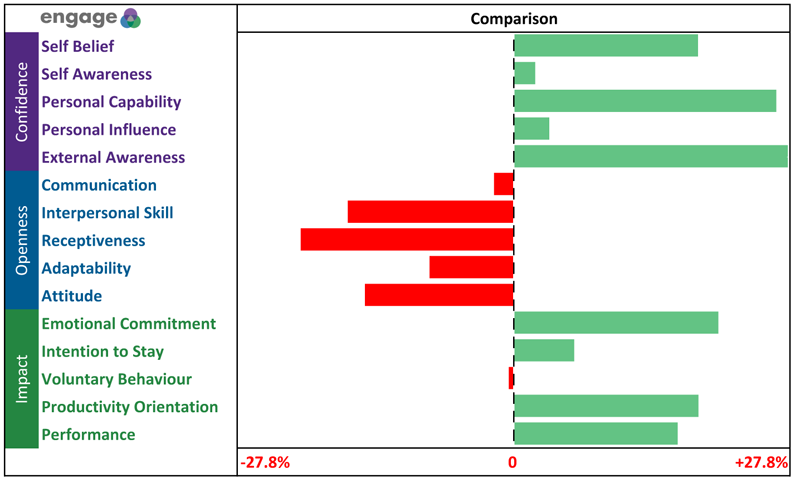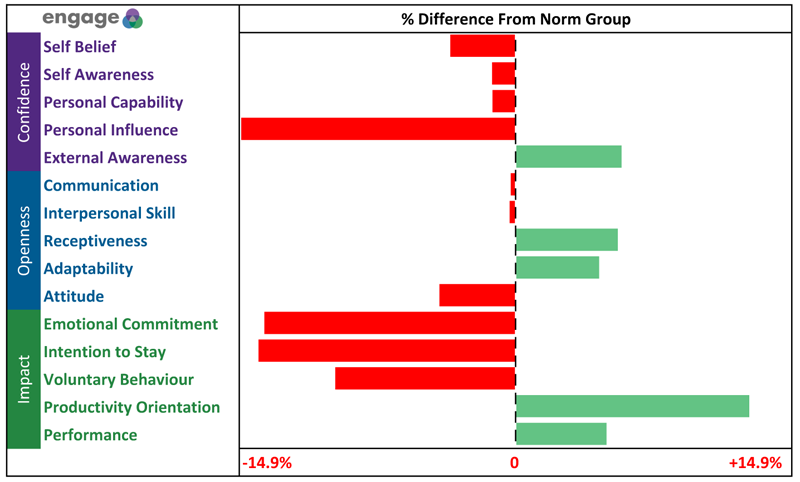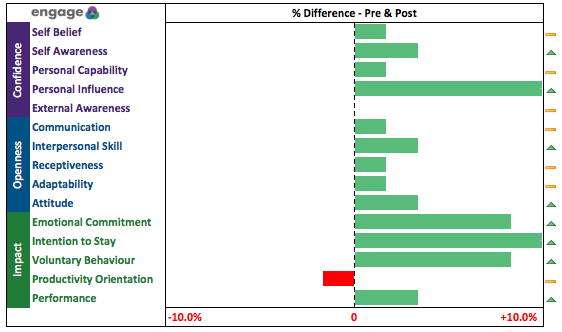[vc_row][vc_column][vc_column_text]
How can HR support organisational change?
How can HR support organisational change? – an article written for HRD/HRM and OD specialists
The challenge
How can HR support organisational change, or more specifically, ‘how easy is it to engage employees in change?’ The answers will vary depending which lens we use.
Yet if we are unable to support and develop our employees to engage with change, we risk serious disengagement.
Disengagement is costly. Less productivity, declining revenues, lack of innovation, poor customer service, increased absenteeism and higher recruitment costs*. It is a key reason 70% of change projects fail to meet objectives**.
Understanding how confident and open employees are to change is key. Doing so allows us to define the types of activities, support and interventions needed to help facilitate successful organisational change. A lack of openness to new ideas means we resist change. A lack of confidence means we don’t try.
Assess change readiness?
 There is a paucity of data relating to employee change readiness.
There is a paucity of data relating to employee change readiness.
Until now.
Engage, a tool developed by Dr Jodi O’Dell in 2011, is a robust change readiness assessment tool.
Employees complete the Engage assessment in just ten minutes. The result is a rich set of reports and data providing robust, empirically validated, insightful data, into the change readiness of your organisation.
Confidence: the first category measured by Engage is the confidence of your people.
Are they confident to engage in change? Do they believe they can do the job required? Do they believe they can influence outcomes? Are they confident in interacting with all stakeholders? How confident are they when the landscape changes?
Openness: the second category assesses how open they are to change.
Are they open in their communication style? Do they build strong relationships? Are they open to (critical) feedback? Receptive to new ideas? Are they agile, and willing to engage in actual change? Are they optimistic (or cynical) about change?
Impact: thirdly, Engage measures the perceived impact of your employees.
Are they emotionally committed and wanting to stay? Willing to go the extra mile? Driven to achieve objectives? Do they believe they are succeeding?
Answers are shown across 15 empirically validated scales. Lower scores highlight inhibitors which can interfere with successful engagement in change. Higher scores suggest areas to leverage to help drive through change. However your organisation scores, the Engage data provides a rich insight into your prevailing culture.
Intervene appropriately, measure the impact
The Engage Pulse data allows HR and organisational development (OD) specialists to support organisational change. How? By defining appropriate interventions to target groups based on emperical data. It allows for comparison between high or low performing departments, locations, job functions etc. Repeating the Pulse on a regular basis provides a real-time analysis of the impact of these interventions and supports organisational change.
Mini Case Study
A large transformation project is about to start. HR commission an Engage Pulse to assess the current change readiness of the company.

Figure 1: Exec Team Mindset (outset, T1)
Figure 1 shows the Exec Team’s collective mindset. They are supremely confident, driven and believe they are performing. They are less open to building relationships, new ideas, feedback, change and are quite cynical about the outcomes of personal change or development.

Figure 2: Employee Mindset (Engage Profile) (outset, T1)
Figure 2 shows employees want to deliver to a high standard, but feel significantly less confident in their ability to influence others or outcomes. As a result they take less initiative, don’t challenge others and play the blame game. The potential impact is not speaking up when something won’t work, might cost too much money or might have a significant detrimental impact on customer service. Their low Personal Influence scores might also be the reason for the much lower Emotional Commitment, Intention to Stay and Voluntary Behaviour scores.
The overarching theme presented is one of a driven confident, committed and performing leadership team, yet distant from others, not receptive to new ideas or feedback, and quite cynical about the benefits of personal change or development. The lack of openness from the Exec Team, allied to their supreme confidence and drive, is causing disengagement amongst the workforce.
From an organisational design (OD) perspective, this data suggests the following interventions to address:
- Exec Team development: work with the team to raise awareness of the team’s mindset and impact on others. Work 1:1 highlighting high personal Engage scores to both leverage whilst being aware of possible derailment. For example: high Productivity Orientation (drive) can lead to being overly competitive, demanding and too much of a perfectionist. The Engage Self Development Reports, or Coach Reports, highlight not only personal scores, but also how to work with them, driving clear actions. Board and Manager appraisals to include measurements around being open to feedback.
- Employee development: run themed workshops to address the lack of Personal Influence beliefs, and/or create a series of focussed webinars, or use the Virtual Coach. Ensure all employees have a forum to speak, challenge or question the change strategy. Ensure managers listen and take employee ideas into consideration. Clearly communicate when employee ideas/concerns have changed the approach to demonstrate their voice counts.

Figure 3: Employee Post Data – showing degree of shift since T1
Six months later, after extensive effort to address change inhibitors, HR reruns the Engage Pulse to assess the impact. Figure 3 shows that employees rate Personal Influence higher (a swing of 10% to positive). Overall levels of engagement are higher (swings of 8-10% higher scores on Emotional Commitment, Intention to Stay and Voluntary Behaviour). The collective belief around personal success at work (Performance) has also increased.
The Executive Team receive personalised Impact Reports showing personal degree of shift across the validated Engage scales.
The outcome from the programme is a more engaged workforce, and a more effective leadership team. The organisation is no longer hemorrhaging employees at the same rate (though more can be done), innovation has increased as employees take more responsibility. HR/OD specialists refine their approach to continue to leverage high scores, whilst addressing inhibitors.
The above example might be true of any organisation anywhere in the world.
Using Engage in this way provides answers to questions such as;
- What is the prevailing appetite for change?
- Who are our change ambassadors?
- Which departments are more resistant to change, and what can we do about it?
- How is our culture impacting our ability to engage in sustainable change?
- What do we need to focus on to support organisational change?
Engage Pulse provides unique insight into organisational culture, provides a very real readiness for change measurement, suggests appropriate interventions, and measures the results. In short, Engage supports organisational change.
Supporting organisational change is fraught with difficulty.
By taking a change readiness pulse of your employees at regular intervals, you can, for the first time, assess what is likely to interfere with successful change, and what is likely to accelerate change. After defining, and delivering appropriate interventions, you can measure the success and impact of your investment.
Sound too good to be true? Support organisational change by Assessing readiness for change in your organisation – ask us for a free trial.
Sources
*McKinsey, Deloitte, Ken Blanchard, Harvard Business Magazine
**Employee Engagement Research (Master List of 32 Findings), link.
© Engage Coach International 2020[/vc_column_text][/vc_column][/vc_row]
